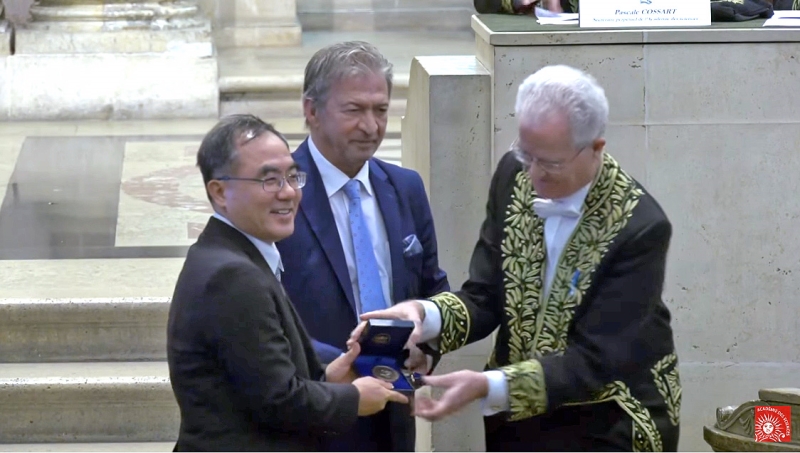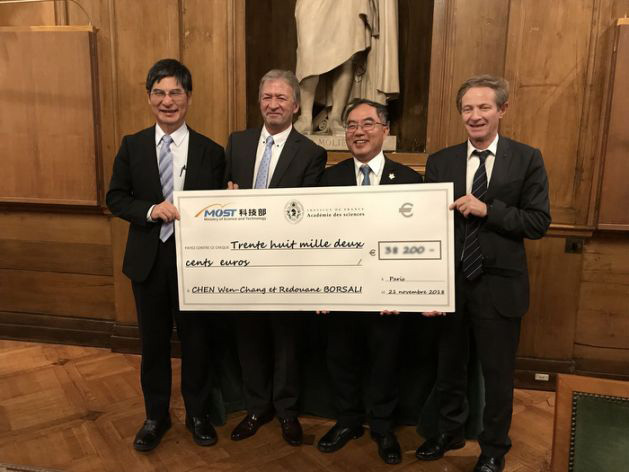Dean Chen and CNRS Research Director Awarded 2018 Franco-Taiwanese Scientific Grand Prize
NTU Dean of Engineering Wen-Chang Chen and French National Centre for Scientific Research (CNRS) Research Director, Dr. Redouane Borsali, were awarded the 20th Franco-Taiwanese Scientific Grand Prize under the lofty dome of the Institut de France, a prestigious landmark known as France’s palace of knowledge, on November 20, 2018.

The laureates were recognized for their research on replacing inorganic materials used in electronic devices with renewable materials, and for their endeavors in enhancing industry-academia collaboration by sharing their findings with industry. Established in 1999, the Franco-Taiwanese Scientific Grand Prize is presented annually by Taiwan’s Ministry of Science and Technology (MOST) and the French Academy of Sciences according to the Franco-Taiwanese Scientific Foundation Agreement.
Every year, MOST invites Academicians of Academia Sinica to join French Academicians on the board committee to select a group of French and Taiwanese researchers who have made significant contributions to scientific research and exchange between the two nations. The Franco-Taiwanese Scientific Grand Prize is now recognized as one of the Institut de France’s Grand Prix presented in November every year.
MOST and the French Academy of Sciences co-hosted the Franco-Taiwanese Scientific Grand Prize award ceremony and the laureate lectures on November 21, 2018. The prize was presented by Taiwan’s MOST Minister Liang-Gee Chen and the Academy’s President Sebastien Candel. Other attendees included Director of the Taipei Representative Office in France, Chih-Chung Wu; Director General of French National Research Agency, Dr. Thierry Damerval; and President of the Université Grenoble Alpes, Dr. Lise Dumasy.
During the ceremony, the two sides also renewed the Franco-Taiwanese Scientific Grand Prize for another 10 years and expected to see even more collaborations in artificial intelligence besides those in the fields of chemistry and chemical engineering.
With the support of both institutes, Dean Chen and Dr. Borsali started their research in 2011. They have worked together to use renewable carbohydrate-based block copolymers, an abundant biodegradable resource, as the charge storage layer of organic electronic components. The non-volatile memory of the electronic components can be controlled using the material’s chemical or self-assembly structures.
Chen and Borsali published their findings in major materials science journals. For example, they discovered that the charge storage layer of organic semiconductor field-effect transistors using oligosaccharide-based block copolymers exhibits a write-once-read-many (WORM) memory, an excellent on/off current ratio, and a stability of several months (Adv. Mater. 2015).
More recently, the preparation of soft polybutylacrylate-cored, star-shaped carbohydrate-block-polyisoprene has enhanced the charge storage window, forming a crosslink-like structure that exhibits superior physical stability under extreme stretching conditions compared with linear structures (Macromolecules. 2018).
Dean Chen and Dr. Borsali have years of experience working together. Their future cooperation will focus on the application and development of green renewable materials for high-performance electronic components. Both researchers aim to cultivate more highly skilled R&D talent and expand academic cooperation between the two countries.

Minister Chen and President Sébastien Candel awarding the cash prize to the two laureates